‘The People v. O.J. Simpson’ cast connected with their characters — and each other
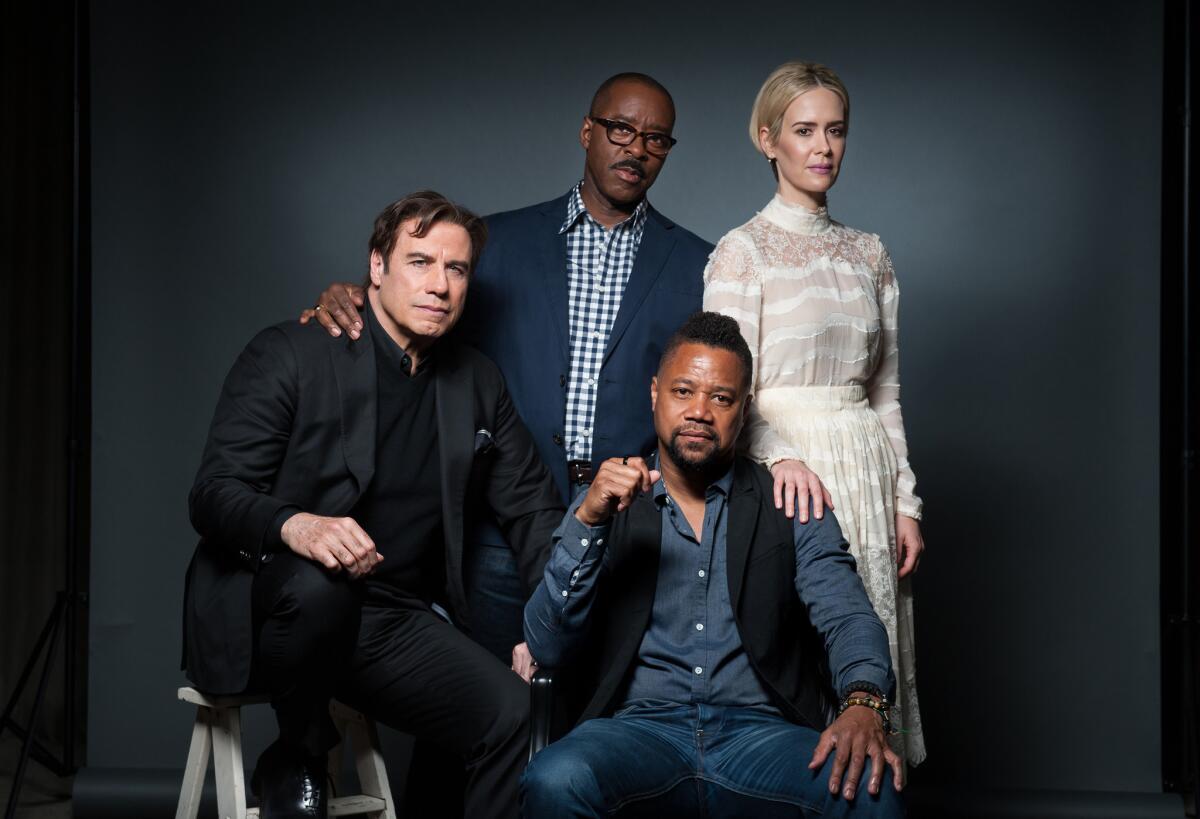
- Share via
It’s the TV drama that reminded us truth can be more sensational — and eerily prescient — than fiction.
Twenty-one years after the trial of the century, “The People v. O.J. Simpson: American Crime Story” managed to reignite in dramatic fashion the nation’s obsession with Simpson’s trial on charges that he killed his ex-wife Nicole Brown Simpson and her friend Ronald Goldman — provoking Google fact-finding, countless tweets and numerous think pieces.
The Envelope gathered its stars — Cuba Gooding Jr. (playing O.J. Simpson), John Travolta (Robert Shapiro), Courtney B. Vance (Johnnie Cochran), and Sarah Paulson (Marcia Clark) — to talk about living within that strange fictional reality in the FX anthology series.
When your agent says Ryan Murphy wants to meet with you about a TV project, what is your reaction? What sorts of questions do you ask?
John Travolta: I said no right away. We’ve seen it. We experienced it. We lived it. It’s just a guilty pleasure of some sort and I’m not interested. My manager called again and I said, “I’m really not interested. I don’t want to do this.” He said, “Would you just meet with them?” We met at a restaurant for about three hours. I was grilling them. I mean, I’ve had tragedy in my life. I just don’t like the feel of this. “Tell me what else we’re saying other than the obvious.” They said: “The birth of 24-hour news, the birth of reality shows, the race issues that are still happening.” “OK, we’re getting warm.” The first script said it all. It said these people are serious about a multi-messaged communication that has great care in the way they are telling untold truths.
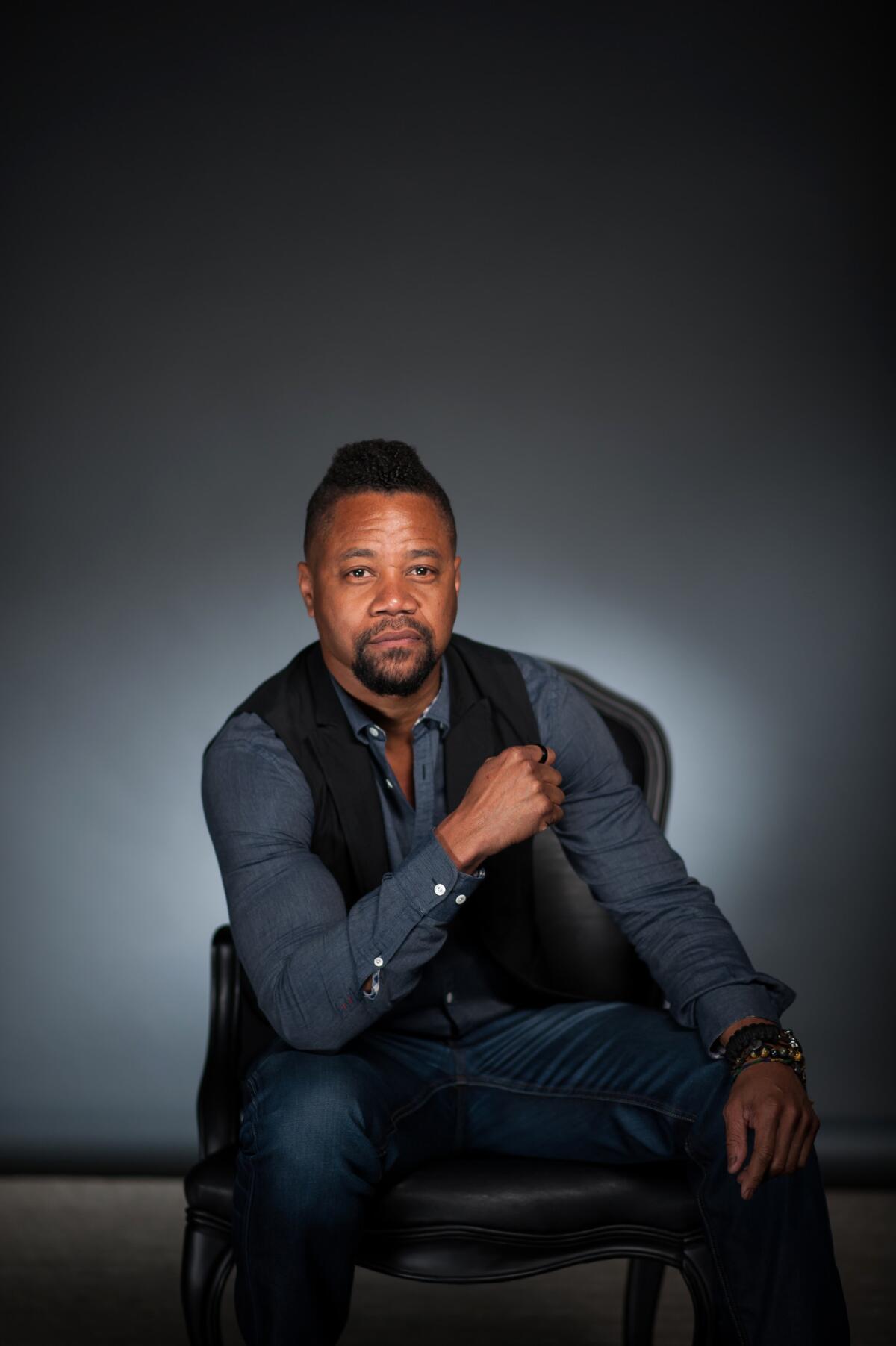
Sarah Paulson: I was terrified not so much of what was going to be required of me, energetically. I was just terrified I wasn’t going to be able to pull off the Marcia thing. I think when you sit down and you imagine taking on a real person that many people have an immediate, iconic image of in their mind, an assessment that has been made — and I was guilty of that myself — I thought, “God, this seems like a terrifying opportunity to fail in a way that wouldn’t be a quiet fail. This is going to be the thud heard around the world.” But because it was Ryan, who basically didn’t give me a choice, he called me and was like, “You’re doing this.” And because I had already done stuff with Ryan that, to me, seemed impossible — playing a double-headed person — I just sort of felt: “If he thinks I can do it, I’m going to trust it.”
Travolta: There is nothing like the power in the belief of someone. Actors need that more than anything.
The series had people talking even before it aired. How do you revel in the success of it while also acknowledging, at the end of the day, two real people died?
Cuba Gooding Jr.: It’s like how John put it in his initial meeting: Are you guys here to exploit this murder trial? You know there are family members that are still grappling with all of this. The parents of these people are still with us and they’re going to have to walk through this all over again. With me, it was always my desire to capture the truth so people can revisit this time period of 1994-95 in Los Angeles — post-Rodney King, police brutality and corruption. I had starred in a movie, “Boyz N the Hood,” [a few] years prior to this trial happening. I was a young, black, frustrated male, and here we are still dealing with this ... in 2016. It’s our job as artists to shine a light on society’s ills so we can find some form of healing and kind of dissect what went down in history so we can learn from it and not repeat it.
Travolta: The intention was never to exploit the tragedy — ever. And because there were truths not known, there is, for some watching, a kind of leveling of the playing field emotionally. They can look at it and say, “Oh, I didn’t know that.” This was more a view of the legal and judicial system and an evaluation. But there were moments where I — I mean, in the last episode where [Christopher] Darden [played by Sterling K. Brown] hugs that family, it moved me deeply. In an earlier episode, when Goldman’s father [Fred, played by Joseph Siravo] describes — brilliantly done, by the way — the depth of pain. Anyone who has experienced the pain of losing a child — and I have — he’s mirroring your feelings. So to some degree, you can help people understand and, sometimes, feel differently.
Courtney B. Vance: We’ve respected the journey that people took and — I mean, it was the first time since the Kennedy assassination or the moon walk that we were all watching collectively as a nation. But what we didn’t do — because we weren’t sophisticated enough at the time — we didn’t fully process it. And because we put this in everybody’s living room, we also have a responsibility to help people come down from it. And we didn’t do that when it happened.
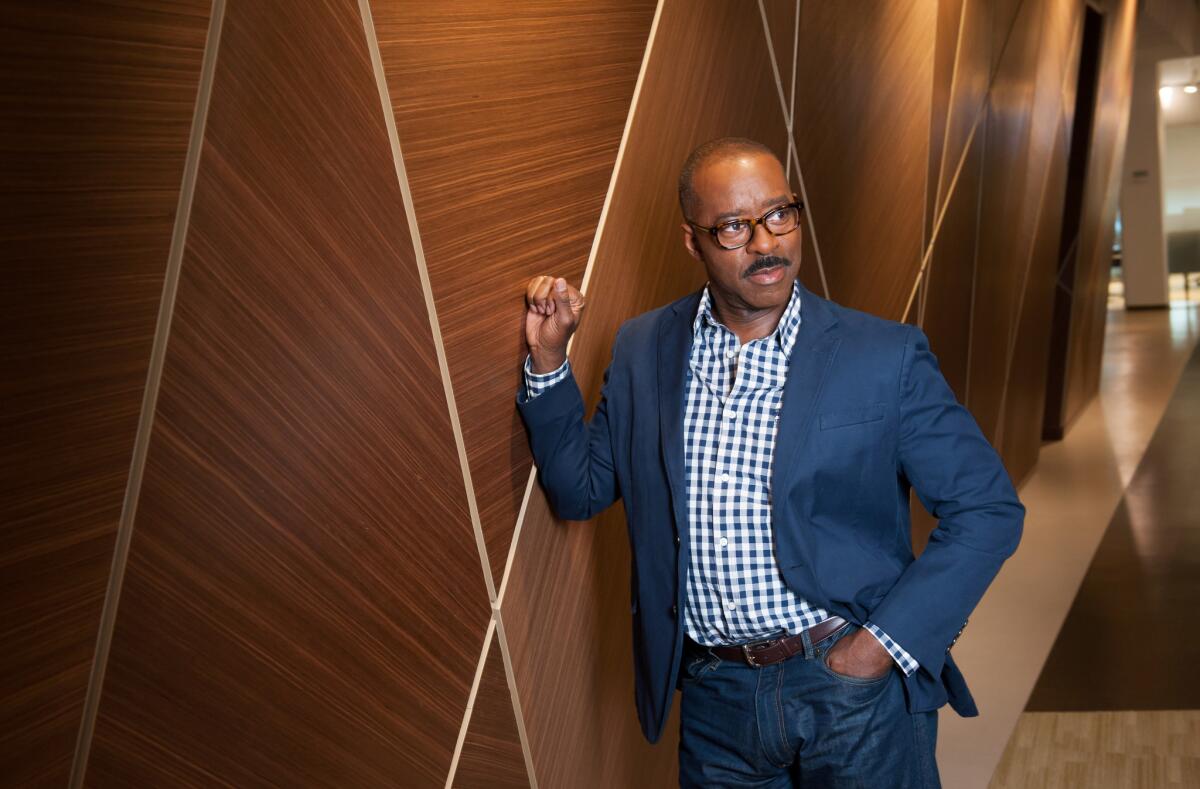
How would you describe the cast dynamic off set? Did you keep to your respective teams, prosecution and defense?
Travolta: Sarah and I could not look at each other, first of all —
Vance: Forget you two. If she looked at me, I would have been done.
Travolta: God forbid we ever do a stage play together.
Paulson: It could never happen. In a couple of years, if things aren’t going well for us, maybe we can take this on the road. “O.J. on Ice.” People would pay top dollar.
In a couple of years, if things aren’t going well for us... We could just find ourselves on the road doing this. ‘O.J. on Ice.’
— Sarah Paulson, who played Marcia Clark in "The People v. O.J. Simpson: American Crime Story"
Travolta: I mean, the content we were doing was so tragic that we had to balance it out on occasion —
Gooding: Once they yelled “Cut!” in those courtroom scenes, what would happen, John?
Travolta: Your pants would come down or we’d imitate other actors.
Gooding: There would be 200 extras standing there and looking at us.
Paulson: It was really wild. It was a little bit like doing a play with all the lights on. We had an audience there for part of the whole thing. We’d get up there to do our arguments — the defense and prosecution — and you’d get them applauding after getting through dialogue or monologues that were particularly tough or herculean in language. They were all for us. They were wanting us to do well. It was a very exploding thing, in a way, to be doing all this stuff with the lights on.
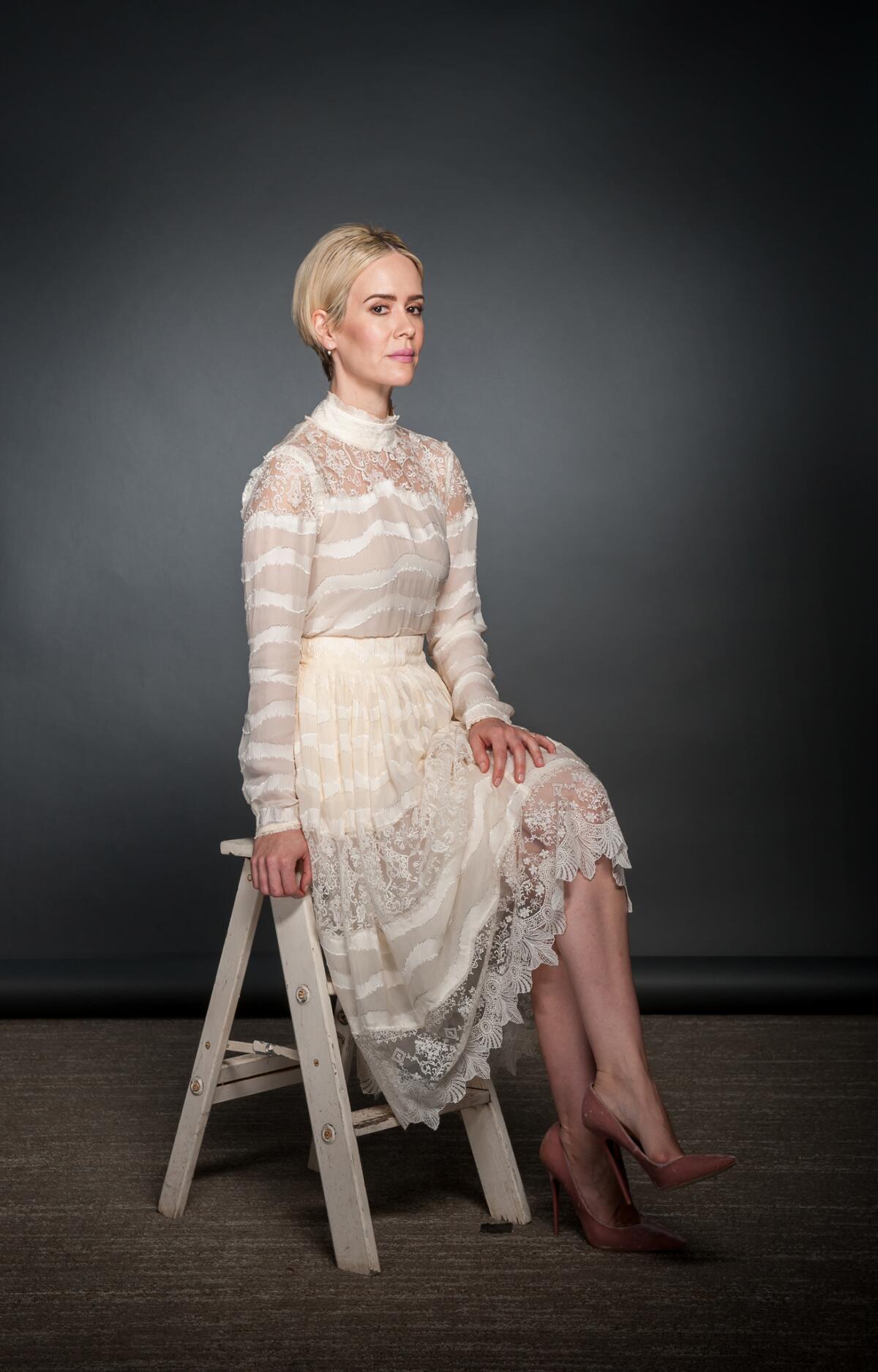
And there were about eight cameras going at any given time. Not only the actual film cameras, but we had those Court TV cameras, which were up high and filming everything to try to capture all the different ways this trial was shot. Everybody at any given moment was on camera. Everybody was in this suspended state together. Courtney would come around often, before we would have a big day, and give everyone a fist bump and just make contact with everyone because we all had to do this collectively. Energetically, we all needed each other.
Was everyone toting around marked up books from their respective authors?
Travolta: Oh, yes. I had limited video on Robert Shapiro, but a lot of data from the books, especially the one he wrote.
Paulson: Oh, you should have seen the way people were carrying around their books. There was a lot of dog-earing going on and books being thrown under courtroom tables when the director yelled “action!”
Gooding: People have literally come up to me and said, this episode was particularly powerful in the courtroom because of the reactions of people. And that’s because everyone stayed in the moment. It wasn’t like any of the three directors were like, “We’ll just get this in one [take] and be done after two takes.” No, we went again and again —
Paulson: Which I think contributed to all of us feeling tired and that feeling of “I don’t know if my brain is going to continue to function in a way that’s going to be useful,” which I guarantee you was something we were all feeling.
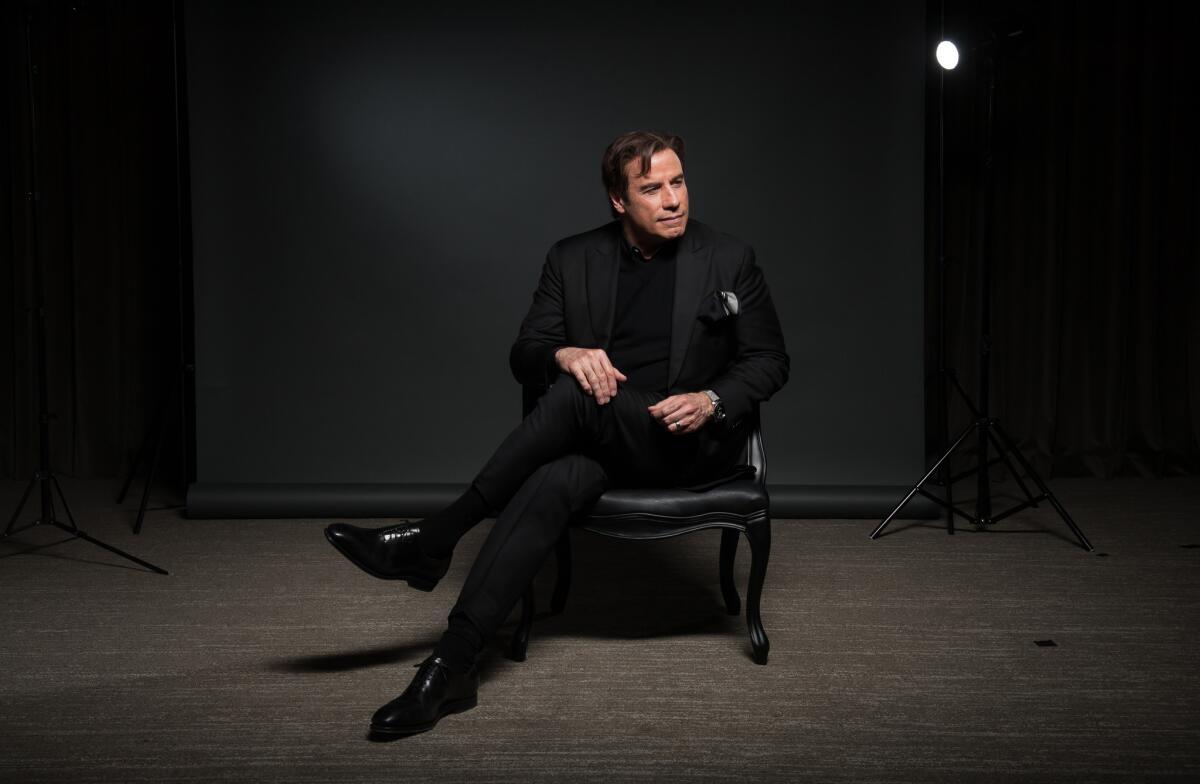
Vance: And, you know, that’s what I think is so great and why it was necessary for Ryan to redo this so we as a community, as a country, as a world, can go back and look at what we missed. We missed a lot of things as we were making judgment on this person and that person, and why the black folks were cheering and why the white folks were aghast, it was very important to revisit this case.
What were the conversations like with your significant others or your friends after a day of shooting?
Vance: I was just so glad to be done.
Travolta: [Courtney and Sarah] had a magnitude of dialogue that I had never seen done. This was like Chekhov or something. Cuba would say to me before Courtney’s 10-page scenes, “Here we go…”
Gooding: [To Courtney] I didn’t think you were going to make it through the DNA dialogue. Because you would repeat it and I’d be like, “I don’t even know what you’re doing right now.”
Did you most enjoy scenes inside or outside the courtroom?
Gooding: I hated that … courtroom. Have you ever been in a courtroom, for whatever reason? Even for a traffic ticket? Those lights. There’s something those lights do to your brain.
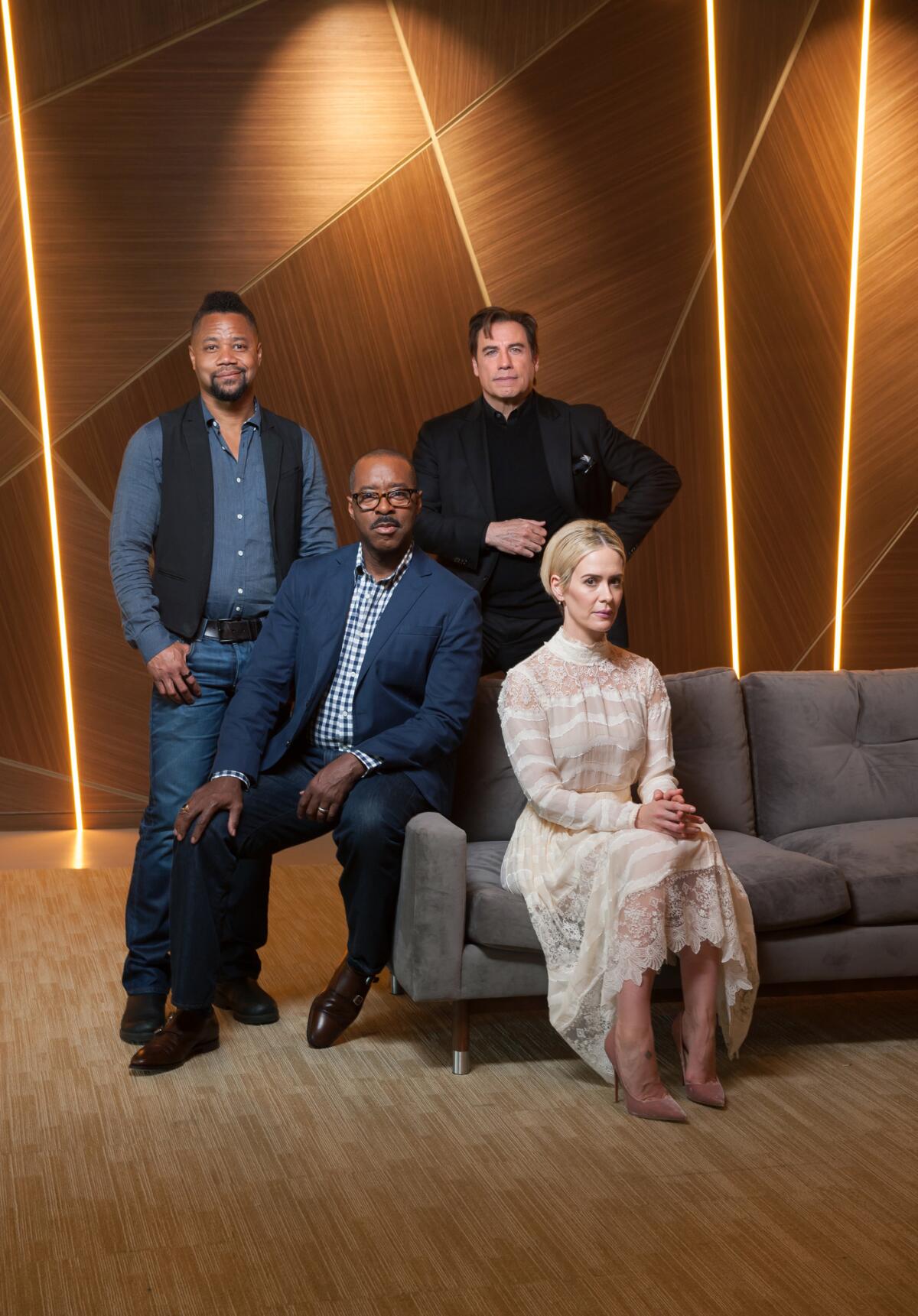
Paulson: There is not one detail in that courtroom set that wasn’t identical to what the actual courtroom was like. So it was a very powerful thing.
Gooding: I have a love-hate relationship with the courtroom, I guess, because it was like a stage, right? We kind of touched on that earlier when we said there were real actors and jurors and every one of them stayed in character. When you walk into that courtroom, it was like gladiators walking into the Colosseum.
Sarah, I think you’re the only one here who met with their real-life counterpart. How important was that for you?
Paulson: I really did want to meet her.
Vance: If you hadn’t met her during filming, would it be OK?
Paulson: I absolutely could have done it without knowing her and I basically did do it without meeting her. I didn’t meet her until we had two more episodes to shoot. I’m very glad I did, but it wasn’t necessary. I think if I met her sooner in the process, it would have made me worry that I was going to need to try to give Marcia what Marcia needed out of it. And that could not be my goal. We were telling the Jeffrey Toobin version of these events.
Vance: If Johnnie was alive, I wouldn’t have wanted to meet him.
Gooding: Sarah and I haven’t seen the show and yet there’s a real strong connection we feel toward our characters. The real effective characters that I’ve portrayed, the performances that I’ve felt it was God’s will that I portrayed, specifically “Boyz N the Hood,” “Jerry Maguire” and now O.J., there has been such a strong connection and examples of how my life mirrors the life of the character that I’ve portrayed. With Tre, I was living in L.A. I had been thrown to the floor by police officers and had guns put in my face on numerous occasions; with “Jerry Maguire,” my career was in a lull and then I got that part and won the Oscar; with this one, my personal life was eerily close to it. I’ve tried to excise that guy.
There’s a real connection to my life with this character. I’m just too close to it. I’m still too close to it.
— Cuba Gooding Jr. on playing O.J. Simpson
I went to church Easter Sunday and as we’re all sitting — I had my mom, my sister, my kids, the nanny — the pastor’s wife came up and said the pastor wanted to see me after the service. So, we all go to the back of the church and there the pastor and his wife are and they say: “Thank you for coming back. We’ve been watching your show and we know there’s a darkness in your soul and we just want to pray for you.” I don’t know if they’re just caught up on the show or if they’re hearing my interviews or whatever, but there’s a real connection to my life with this character. I’m just too close to it. I’m still too close to it.
Do you think 10 episodes was enough?
Paulson: I remember the last day of filming. I walked out of my trailer into [Marcia’s office set], and everything had been taken down. The Jim Morrison picture in the office was now on the ground. All the files, gone. The name on my door, gone. I went in the courtroom too, and everything had been piled up by our prop master with tags all going back. I got this feeling that I hadn’t really been aware of before, which is that it wasn't real. Even to this day, I'll have a conversation with a friend where we'll start talking about the case and I'll go, “Well, what you don’t understand is we didn’t have …” We! I’m like, wait a second, we didn’t do anything. I’m not actually Marcia Clark. I actually didn’t experience this. But somehow, molecularly, I had a weird connection.
Gooding: I had to say that to myself too: You did not actually experience jail.
MORE:
'People vs. O.J.'s' Sterling K. Brown dived headlong into the glove scene: 'I was livid'
'The People v. OJ Simpson': Cuba Gooding Jr. says 'there's so much that trial shed a light on'
Robert Kardashian: Keeping up with the man who stood by O.J. Simpson
Robert Shapiro reveals what O.J. Simpson said after his court verdict was read
Twitter: @villarrealy
Sign up for The Envelope
Get exclusive awards season news, in-depth interviews and columnist Glenn Whipp’s must-read analysis straight to your inbox.
You may occasionally receive promotional content from the Los Angeles Times.




